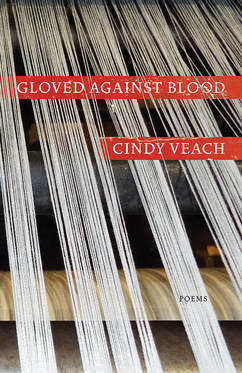Gloved Against Blood by Cindy Veach

Paperback: 88 pg.
Publisher: CavanKerry Press, LTD, 2017
Purchase: 16.00 www.cavankerrypress.org
Review by Jennifer Martelli.
In her debut poetry collection, Gloved Against Blood, Cindy Veach stitches a masterpiece of bloodlines. In her ghazal, “Dear Francis C. Lowell,” Veach writes:
Francis, you are the sin--not these cloven,
white perennials planted in a row.
They bleed I weave. I weave they bleed. Why can’t
you see--blood threads your looms all down the row?
Gloved Against Blood is greater than its parts: more than a family history, more than a tale of the looms of Lowell, of the “bloody cotton” that makes up a life and a country. It is a woven fabric, a “Gorgeous one,/red beyond belief . . . .”
Veach’s looms become organisms inextricable from the weavers. In her opening poem, “How It Resists,” the looms are female:
Their stanchions of white thread
spooling like udders,
my needy shuttles
of flowering dogwood
and the whole mill howls
as if cotton were milk--
The women who worked the Lowell mills, left homes--and were left alone in their homes--to provide. Even the act of entering and leaving becomes a living thing, a beast: “Not literal this threshold, two parts wild animal--/something to be wrangled with--one part fir . . . (“This Threshold He Did Not Carry Her Across”)”.
The looms where the speaker’s “French Canadian great-grandmother and great-aunts/toiled thirteen hours a day . . . .and sucked thread through the eyes of their foot-long wooden shuttles (“How a Community of Women”)” provide the structure for Veach to weave her lineage with the blood-history of this country. In the “Lowell Cloth Narratives,” a hybrid-found poem, Veach constructs her own warp and woof using ex-slave narratives and persona, repeating lines throughout the three parts of the poem: “I was born in slavery time—a world away/we wove, we wove away.” Slavery, the stain on the fabric of our nation, fed the Lowell mills. Entanglement with the looms causes blood to spill. The speaker must go to “that unquiet room/of looms” where skin splits open, and sometimes the heart, sometimes the hands of the grandmother cross-stitching despite being “gloved against blood/her bad marriage . . . . (“Predators”).”
The greatest tension in Gloved Against Blood is between the precision of stitching and weaving, and its inevitable unraveling, the tearing apart.
I learned to sew French seams--
seams that hide raw edges
within the seam itself.
Seams that won’t unravel,
that are neat
even on the wrong side--
finished she’d say.
("French Seams")
This masterful poem, which speaks to the flaw inherent in cloth, flips on itself, like a garment turned inside out, when the speaker echoes these lines regarding her marriage: “I learned to hide the raw edges/within the seam itself . . . .I could not salvage us--finished she’d say.” Veach returns to this woman who is both weaver and unraveller. In “Triptych: Travaux d’Aiguille,” the classical image of Odysseus’s Penelope (“But she was not/a sufferer—this weaver of strategies”) is the center panel. She is flanked by “Nanny” and “Mémé,” both pliers of thread and yarn, both women who, like Penelope, unravel the order of things, one abandoning school for the mills, one abandoned by her husband. The speaker in Gloved Against Blood, like “Nanny,” unravels her faith, abandons God:
I finger a single rose,
remember how she kept
track on a scrap of paper
in groups of five.
I lose count, start over--
like her I’ve stopped believing.
(“Like Her”)
Finally, this unraveling becomes as cruel as the arduous work in the mills. Veach introduces the mother, whose mind is fraying, losing its essence. The magnitude of this loss for the speaker is cosmic. Veach begins “My Mother is Forgetting” with the question, “And why no stars tonight?” The mother tangles all the themes in their lives—Lowell, abandonment, lineage—when she corners her daughter with stories:
and the wife he got pregnant
thirteen times—one for each trip
back to Lowell . . . .
It’s as if she knows
she’s forgetting . . . .
(“My Mother Tells Me Stories”)
Gloved Against Blood is a deconstruction of a life, of history, of a landscape. Cindy Veach makes the story of the Lowell mills a female story, her story. She makes it an American story, and there is blood, ugliness, and love. In “On the Grain,” she writes:
And now he hands me
this sturdy fabric Mèmè woves
in the mills of Lowell.
I fold it on the grain
warp to warp, weft to weft, place it
in my basket of remnants.
Veach gathers the frayed ends, strands, and scraps and weaves something beautiful and lasting.

Cindy Veach received an MFA from the University of Oregon. Her poetry has appeared in the Academy of American Poets Poem-a-Day, AGNI, Prairie Schooner, Poet Lore, The Journal, The North American Review, Michigan Quarterly Review, Nimrod International Journal, and elsewhere. She is an award-winning quilter whose work was selected to tour with the Smithsonian. She lives in Manchester-by-the-Sea, Massachusetts.
